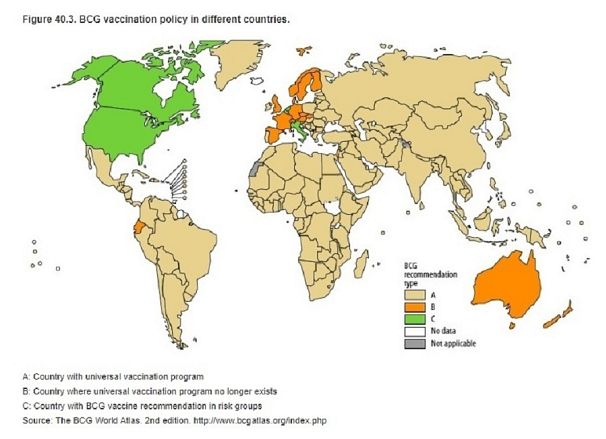Why has Spain had almost 11,000 deaths from the coronavirus pandemic while Portugal’s death toll barely exceeds 200?
Such a disparity in numbers within the Iberian peninsula is mysterious, but it could in part be explained by the two countries’ different use of a vaccine. Not a vaccine against COVID-19, the disease caused by the novel coronavirus – no such vaccine exists yet, rather it is the decades-old tuberculosis vaccine that seems to offer an explanation.
A new scientific study has discovered a possible correlation between countries where it is mandatory to be vaccinated against tuberculosis, also called “Bacillus Calmette-Guerin” (BCG), and the impact of the new coronavirus.
“We found that countries without universal policies of BCG vaccination (Italy, Netherlands, USA) have been more severely affected compared to countries with universal and long-standing BCG policies”, the study’s authors wrote.

“There have been reports that the BCG vaccine can produce broad protection against respiratory infections,” Gonzalo Otazu, a researcher at the New York Institute of Technology and one of the study’s authors, explained on Twitter.
“We looked at the data: countries that never implemented a universal BCG vaccine were being hit hard by COVID-19, with a high number of deaths per capita.”
Otazu compared policies in countries where tuberculosis vaccination has been universally applied – where everybody must be vaccinated – and countries where is has not been.
Italy, the country with the highest number of deaths from COVID-19 with 13,915, has never universally applied tuberculosis vaccination.
Japan, which has reported only 63 deaths from coronavirus and has taken less stringent containment measures, has a universal tuberculosis vaccination policy.
The researchers also compared Iran to Japan, two countries that have applied universal BCG vaccination, but at different times.
Japan started its universal BCG vaccination policy in 1947 while the Iranian policy was put in place in 1984. Japan has about 100 fewer deaths per million inhabitants than Iran, they found.
“Countries that have a late start of universal BCG policy (Iran, 1984) had high mortality, consistent with the idea that BCG protects the vaccinated elderly population”, the authors wrote.
“We also found that BCG vaccination also reduced the number of reported COVID-19 cases in a country.”
The different impact of coronavirus in Western and Eastern Europe
The research could also explain the difference between the impact of the coronavirus in Western and Eastern Europe, because universal tuberculosis vaccination policies were widely spread in the countries of the former Soviet Union (USSR).
The eastern states of Germany, which were part of the USSR as East Germany until reunification in 1990, have lower numbers of COVID-19 cases per 100,000 people, according to the Robert Koch Institute’s national tally:

In Spain, the second country with the most deaths from coronavirus in the world, only one region, the Basque Country, includes the BCG vaccine in its official vaccination policy, according to the Spanish Annals of Pediatrics.
Clinical trials begin in Australia
A team of Australian researchers announced on Friday that they have started testing the tuberculosis vaccine on a large scale to see if it can protect healthcare staff from the coronavirus.
About 4,000 Australian hospital workers will participate in the clinical trial that will seek to determine if the tuberculosis vaccine can reduce symptoms of COVID-19, researchers at the Murdoch Institute in Melbourne said.
“Although it was originally developed for tuberculosis and is still administered to more than 130 million babies each year, BCG also increases the body’s basic immune capacity, helping it to respond more strongly to germs,” the researchers said in a statement.
“We hope to see a reduction in the frequency and severity of symptoms of COVID-19 in healthcare workers who have been vaccinated with BCG,” the head of the research team, Nigel Curtis, explained.
Similar tests will also be carried out in other countries such as the Netherlands, Germany and the United Kingdom.
If clinicians can prove that the clinical trial is successful, the elderly and other people who are vulnerable to COVID-19 due to underlying conditions could receive the tuberculosis vaccine to cope with future outbreaks of the coronavirus.
A German study has suggested that in that case, the tuberculosis vaccine could “help to bridge the time” until a vaccine specifically effective against the novel coronavirus is developed.
A vaccine from a century ago
French scientists began developing the BCG vaccine in 1908 and the first human trials began in 1921. The name BCG, Bacillus Calmette-Guerin, comes from the names of the two bacteriologists involved: Albert Calmette and Camille Guerin.
Tuberculosis is caused by bacteria that attack the lungs. People contract it by being in close contact with an infected person as they sneeze or cough.
The disease became especially common after World War II and the use of the drug spread during the 1950s, when large specialised hospitals were created to treat tuberculosis patients.
Tuberculosis or BCG is highly infectious and despite being a preventable and curable disease, each year 10 million people become infected and 1.5 million people die from it, according to the World Health Organization (WHO).
The WHO also says that tuberculosis is the leading cause of death for people with HIV and a major contributor to antimicrobial resistance.
Doctors conducting the trial in Australia urge the general population not to consider being given this vaccine before the results of the clinical trials are known.
The drug is needed to vaccinate or treat 130 million people each year and high demand would put pressure on limited stocks.
Fewer coronavirus deaths seen in countries that mandate tuberculosis vaccine
Countries with mandatory policies to vaccinate against tuberculosis register fewer coronavirus deaths than countries that don’t have those policies, a new study has found.
The preliminary study posted on medRxiv, a site for unpublished medical research, finds a correlation between countries that require citizens to get the bacillus Calmette-Guerin (BCG) vaccine and those showing fewer number of confirmed cases and deaths from COVID-19. Though only a correlation, clinicians in at least six countries are running trials that involve giving front-line health workers and elderly people the BCG vaccine to see whether it can indeed provide some level of protection against the new coronavirus.
Gonzalo Otazu, assistant professor at the New York Institute of Technology and lead author of the study, started working on the analysis after noticing the low number of cases in Japan. The country had reported some of the earliest confirmed cases of coronavirus outside of China and it hadn’t instituted lockdown measures like so many other countries have done.
Otazu said he knew about studies showing the BCG vaccine provided protection against not just tuberculosis bacteria but also other types of contagions. So his team put together the data on what countries had universal BCG vaccine policies and when they were put in place. They then compared the number of confirmed cases and deaths from Covid-19 to find a strong correlation.
Among high-income countries showing large numbers of COVID-19 cases, the U.S. and Italy recommend BCG vaccines, but only for people who might be at risk, whereas Germany, Spain, France, Iran and the U.K. used to have BCG vaccine policies but ended them years to decades ago. China, where the pandemic began, has a BCG vaccine policy but it wasn’t adhered to very well before 1976, Otazu said. Countries including Japan and South Korea, which appear to have managed to control the disease so far, have universal BCG vaccine policies. Data on confirmed cases from low-income countries was considered not reliable enough to make a strong judgment.

